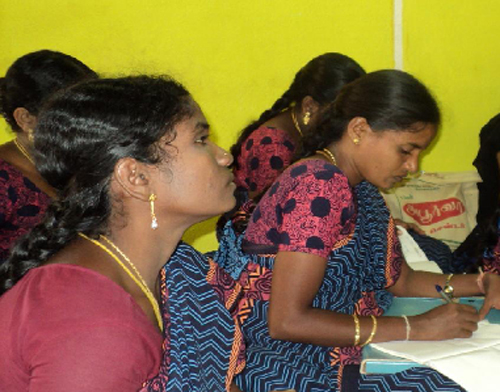By Sangeetha Lakshmanan, Research Analyst – ICTPH
Thursday mornings are of special significance for the Guides and Nurses at our Rural Micro Health Centre (RMHC). It is the time of the week when the Guides eagerly look forward to participating in the Thursday Case Training and Discussion, where the nurse schedules a session about a specific health condition based on its registered frequency at the RMHC and health problems that Guides have seen in their village – making class work more meaningful as it relates to real persons and real problems recently seen in the clinic or community.
The objective of the training is to enable the Guide to understand the environment in which she lives as well as to develop trust among the members of their community through her knowledge, regular follow ups and keenness to ensure the wellness of all community members. The Guide who was until now just a friend, neighbour, or relative has the potential to slowly begin to assume the role of a major source of information to the members of her community through these trainings. She takes notes, asks questions on behalf of the community members and understands linkages, causal factors, simple management of various health conditions and provides navigational guidance to members in the community by means of timely referrals.
What is most interesting to see during these training sessions is the attentiveness of the Guides and their impetus to score well in the post-test that is used to evaluate their individual understanding. Having taken tests/exams long back in school or college, it is especially encouraging to see how they mark their responses carefully and go through their answer sheet one last time before handing them in to the nurse who then enters these scores into the HMIS for long term monitoring of the Guides’ growth. While encouraging healthy competition, these tests also act as a bonding exercise amongst the Guides and the nurse.

The test is followed by a discussion on the Guides’ weekly experiences in their respective localities. Sitting in a circle, the nurse listens to each Guide, while carefully addressing their concerns, queries and doubts. This is done with the intention of clearing questions or situations that the other Guides might encounter during their home visits. Motivation is reinforced through these sharing sessions and appreciation of successful efforts, performances and community interactions. These meetings also address the Guide’s early struggle for acceptance from the members of her community, neighbours and family. The reverse referral aspect, where the teacher and trainee meet and discuss problems every week is an important part of maintaining close communication, training and bonding between these two critical levels of functionaries within the health system.
Where is the Thursday Training and Discussion held? They are held beside the RMHC and follow an open door format so as to encourage mothers, fathers, children and others in the community to sit and watch what is going on and help them develop confidence in their own Guides.
While the initial training for the Guide equips her with the basic skill sets and knowledge to perform her day-to-day functions in the village, support systems like these along with refreshers and ongoing training will allow the Guide to acquire new skills, take on new challenges and interact with other members of the health team, keeping her role interesting and promoting personal development.
Bibliography
FRCH. (2001). The Taluka Level – The Peoples Health Comples. In N. Antia, G. Dutta, & A. Kasbekar, Health and Medical Care – A Peoples Movement (pp. 60 – 81). Pune: The Foundation for Research in Community Health.
Werner, D., & Bower, B. (2005). Practice in Attending the sick. In D. Werner, & B. Bower, Helping Health Workers Learn – A book of methods, aids, and ideas for instructors at the village level (pp. 8 (1) – 8 (16)). California: The Hesperian Foundation.


Leave a Reply
1 Comment on "Adapting Guides Weekly Training towards Community Health Needs"
[…] at the RMHC with the community members in the surrounding catchment. As you may have read about in previous posts, the Sugha Vazhvu Guide program was designed to do just that. In its first year of operation, each […]